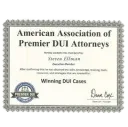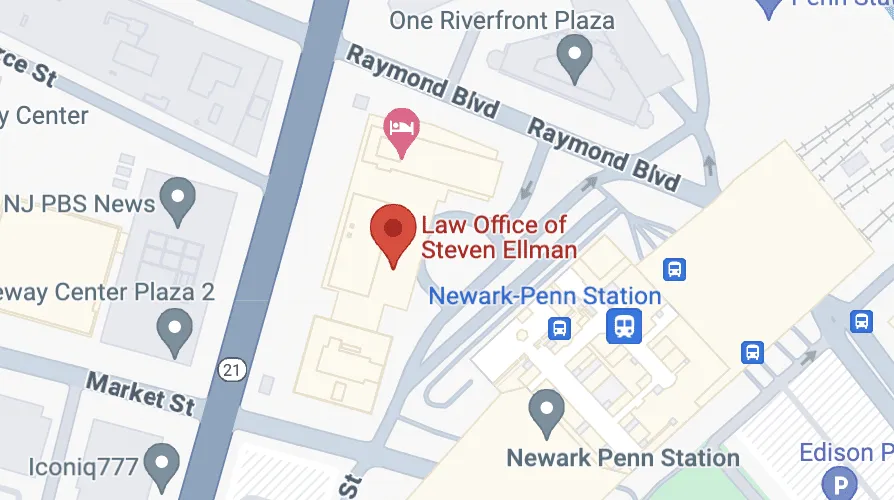If you’re involved in a DUI, you might be considering representing yourself. Federal law allows you to represent yourself in a court case in any of the 50 states. However, just because it’s an option doesn’t mean it’s a good idea.
Some people choose to represent themselves in DUI cases because they’re worried about the cost of hiring an attorney. Others underestimate the seriousness of the offense, especially first-time DUI offenders.
It’s always best to talk to an experienced DUI attorney when you’re facing DUI charges. Attorney Steven Ellman has been representing clients with DUI charges for the last four decades. He’s helped countless clients avoid excessive penalties and, in many cases, has succeeded in getting their charges dropped altogether.
Possible Consequences of DUI Charges in New Jersey
If you’re convicted of a DUI charge, you could face jail time, fines, and driving restrictions. The severity of the punishment depends on any prior DUI convictions you have and your blood alcohol content (BAC) level during the incident.
Here are the potential legal penalties for driving while intoxicated (DWI) under New Jersey law:
First-Time DUI
First-time offenders may face fines of between $250 and $500 and jail time of up to 30 days. They may also have an ignition interlock device installed for between three and 15 months, depending on their BAC level.
Second-Time DUI
Second-time offenders risk imprisonment for up to 90 days, a fine of between $500 and $1,000, mandatory installation of an ignition interlock device for two to four years, and license suspension for between one and two years.
Third-Time DUI
Third-time offenders could see up to 180 days in jail, a $1,000 fine, a license suspension of up to eight years, and the mandatory installation of an interlock device for two to four years.
Additional penalties include mandatory Intoxicated Driver Resource Center (IDRC) program hours, increased insurance rates, and possible victim compensation costs, depending on the specifics of the case.
The Risks of Representing Yourself in a DUI Case
While you have the right to represent yourself in a court of law, there are several reasons why it’s not in your best interests to do so.
Lack of Sufficient Legal Knowledge
The laws involved in DUI cases can be complex for someone who isn’t a legal professional. For example, New Jersey has implied consent laws that govern field sobriety tests. Refusing to submit to these tests could carry extra penalties. Even when you comply, the results can be used as evidence against you.
Additionally, the BAC level for first-time offenders in New Jersey directly impacts the severity of the penalties. Because of these implications, it’s crucial to present strong evidence, which can be difficult without legal expertise.
Inexperience With the Legal System
Trained attorneys rely on experience to win cases. Without it, you may struggle to handle critical aspects of your case, such as:
- Properly navigating courtroom procedures
- Filing paperwork on time
- Effectively cross-examining witnesses
- Knowing how to challenge evidence
Such a lack of experience could seriously undermine your defense and leave you vulnerable to conviction.
Exposure to Excessive Penalties
The main reason defendants hire lawyers for DUI cases is to try and minimize their potential penalties. Drunk-driving convictions carry long-lasting consequences. Naturally, you’ll want to reduce their impact as much as possible.
While a first-time DUI is a serious offense, the law allows for some leniency, with penalties varying based on the offender’s BAC level. A skilled attorney can leverage this fact to decrease the severity of your punishment.
A conviction can also affect future charges, so avoiding one is essential, especially when it’s your first or second arrest. Your lawyer may be able to negotiate a reduced plea deal, which is something self-representation may not offer due to a lack of legal expertise and negotiation skills.
Risk of Self-incrimination
Anything you say during your case can be used against you, and representing yourself could inadvertently lead to self-incrimination. Defending your rights and freedom can evoke emotional reactions, which could unintentionally harm your case.
Lack of Legal Help From the Courts
Don’t expect the courts to provide special accommodations because you’ve chosen to represent yourself. Once you waive the right to an attorney, you’ll be expected to understand and follow all legal procedures as if you were a trained legal professional.
Entrust Your Future to a Capable DUI Attorney
You may have some knowledge of the law and think you could successfully defend yourself in a DUI case. However, strong representation requires experience and an intimate understanding of how local courts and police officers operate.
The consequences of a DUI conviction can affect your freedom, finances, and driving privileges, so it’s vital to take whatever measures necessary to protect yourself. Contact attorney Steven Ellman for trustworthy representation with your DUI issues in New Jersey.














